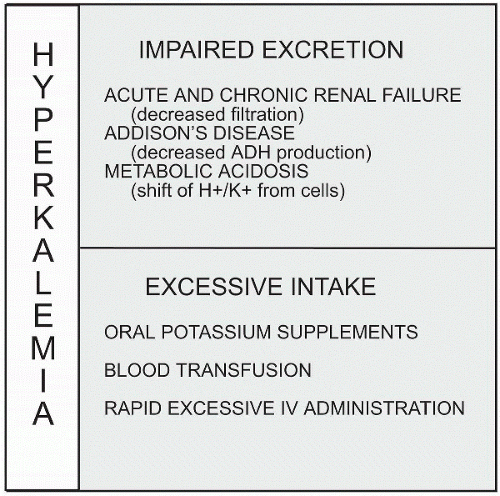Hyperkalemia
QUICK LOOK AT THE CHAPTER AHEAD
Though the range for a normal potassium level is narrow (3.5-5.3 mEq/L), elevated potassium levels are unusual in the healthy person. Hyperkalemia results when potassium accumulates in the extracellular fluid to a level greater than 5.3 mEq/L. In this chapter we discuss the causes of hyperkalemia, how it is manifested in the body, and treatment.
Potassium is the main intracellular ion. Hyperkalemia results when potassium accumulates in the extracellular fluid to a level greater than 5.3 mEq/L. Elevated potassium levels are unusual in the healthy person even though the range for a normal potassium level is narrow (3.5-5.3 mEq/L). Potassium becomes elevated in situations of decreased elimination, increased intake, multiple blood transfusions, or with a sudden shift of intracellular potassium to the extracellular compartment (Table 15-1).
The most common cause of hyperkalemia is decreased elimination secondary to renal failure. The renal system is primarily responsible for potassium excretion. When the kidneys are unable to respond to aldosterone (see Chapter 8), the ability to excrete potassium becomes diminished. Certain drugs such as potassium-sparing diuretics, nonsteroidal antiinflammatory drugs, and angiotensin-converting enzyme inhibitors also work by inhibiting aldosterone and contribute to the retention of
potassium. Elevated levels of digitalis inhibit the sodium-potassium pump, thereby inhibiting the balance of electrolytes the pump usually maintains.
potassium. Elevated levels of digitalis inhibit the sodium-potassium pump, thereby inhibiting the balance of electrolytes the pump usually maintains.
Table 15-1 Causes of Hyperkalemia | ||||||||||||||||||||||||||
|---|---|---|---|---|---|---|---|---|---|---|---|---|---|---|---|---|---|---|---|---|---|---|---|---|---|---|
| ||||||||||||||||||||||||||
Stay updated, free articles. Join our Telegram channel

Full access? Get Clinical Tree



